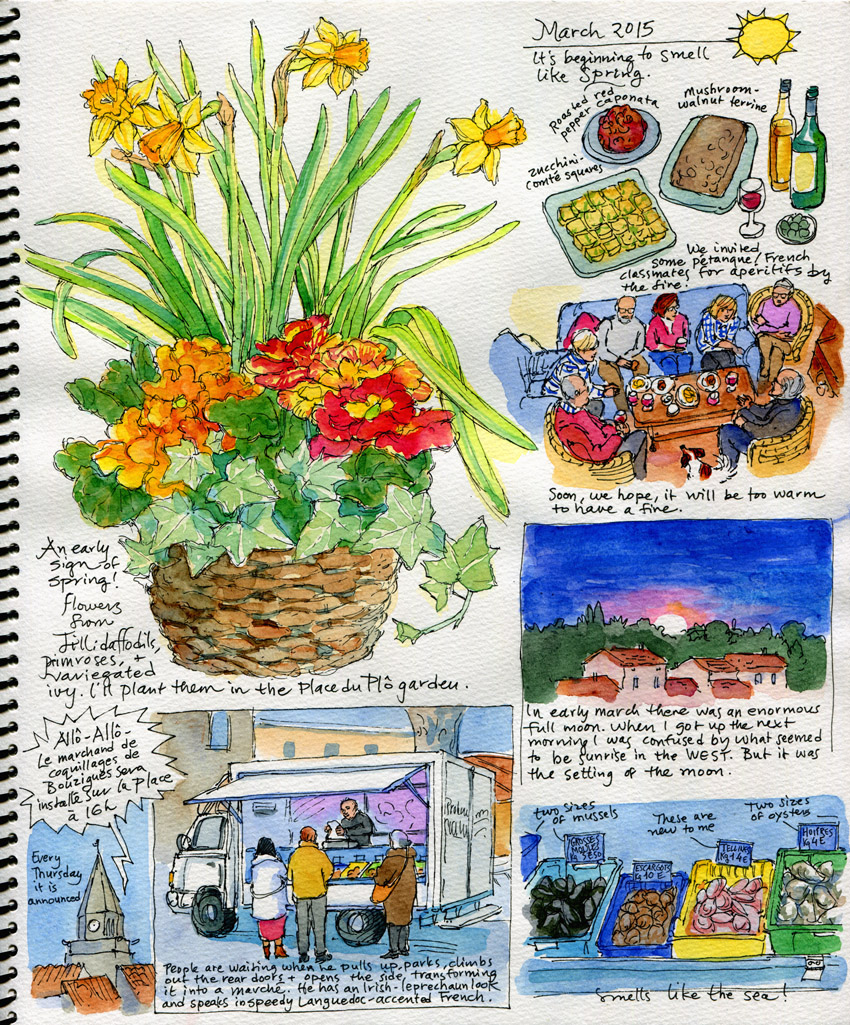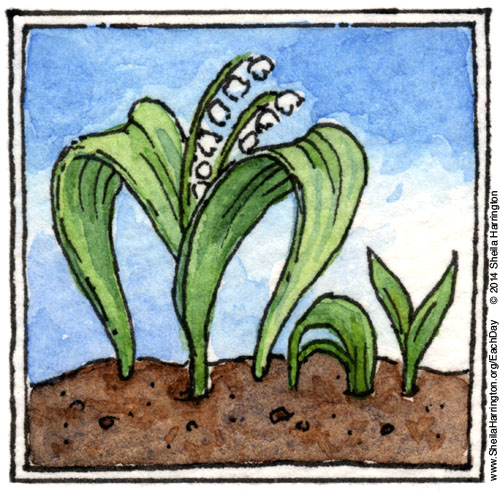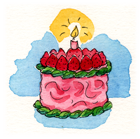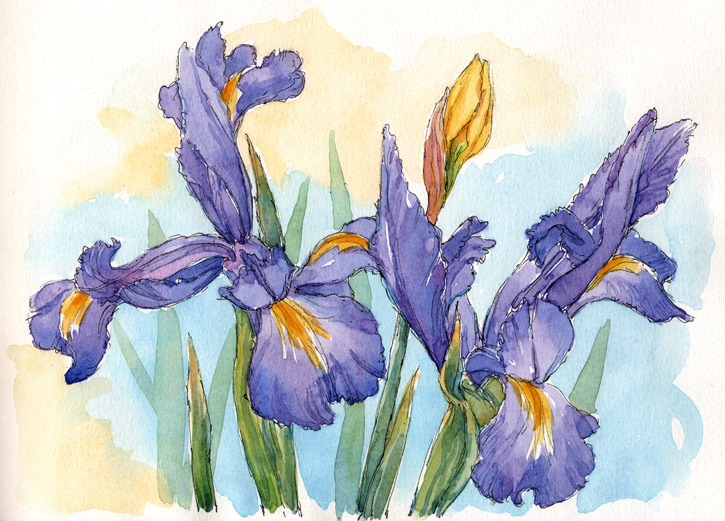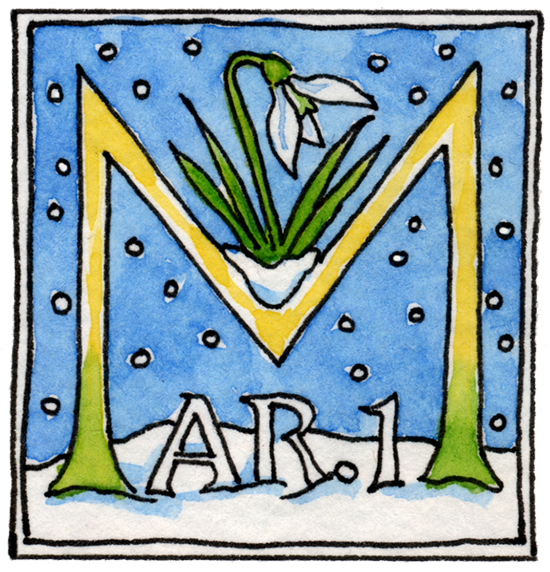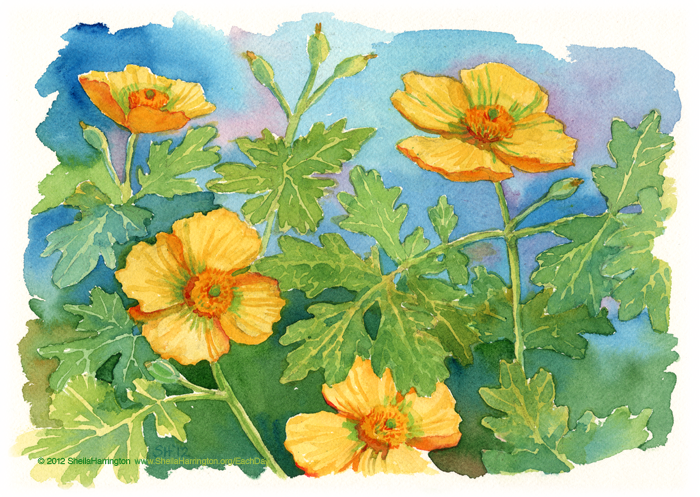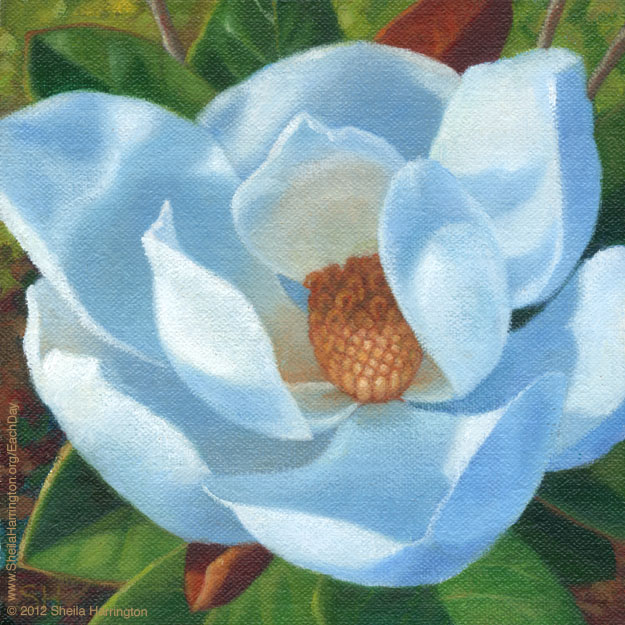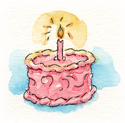Tag: Flowers
The Piemaker
The Sunflowers
A Hello to July, with a poem by Mary Oliver.
Come with me
into the field of sunflowers.
Their faces are burnished disks,
their dry spines
creak like ship masts,
their green leaves,
so heavy and many,
fill all day with the sticky
sugars of the sun.
Come with me
to visit the sunflowers,
they are shy
but want to be friends;
they have wonderful stories
of when they were young –
the important weather,
the wandering crows.
Don’t be afraid
to ask them questions!
Their bright faces,
which follow the sun,
will listen, and all
those rows of seeds –
each one a new life!
hope for a deeper acquaintance;
each of them, though it stands
in a crowd of many,
like a separate universe,
is lonely, the long work
of turning their lives
into a celebration
is not easy. Come
and let us talk with those modest faces,
the simple garments of leaves,
the coarse roots in the earth
so uprightly burning.
—Mary Oliver
The Lily of the Valley
For the first of May, a poem by Paul Laurence Dunbar (1872–1906), who spent part of his brief but prolific life here in Washington, DC.
Sweetest of the flowers a-blooming
In the fragrant vernal days
Is the Lily of the Valley
With its soft, retiring ways.
Well, you chose this humble blossom
As the nurse’s emblem flower,
Who grows more like her ideal
Every day and every hour.
Like the Lily of the Valley
In her honesty and worth,
Ah, she blooms in truth and virtue
In the quiet nooks of earth.
Tho’ she stands erect in honor
When the heart of mankind bleeds,
Still she hides her own deserving
In the beauty of her deeds.
In the silence of the darkness
Where no eye may see and know,
There her footsteps shod with mercy,
And fleet kindness come and go.
Not amid the sounds of plaudits,
Nor before the garish day,
Does she shed her soul’s sweet perfume,
Does she take her gentle way.
But alike her ideal flower,
With its honey-laden breath,
Still her heart blooms forth its beauty
In the valley shades of death.
—Paul Laurence Dunbar
Through Hills and Seas to the Universe
I carved out some time on my birthday to sit in the garden, despite deadlines, mosquitoes and heat, to sit and sketch. It was quiet except for the chirping of birds (especially numerous in our tiny garden this spring) and the distant hum of air-conditioners along the alley. Even a short time spent among growing things is restorative. I share the sketch and this poem.
The trees put forth luxuriant foliage,
the spring begins to flow in a trickle.
I admire the seasonableness of nature
and am moved to think
That my life will come to its close.
So little time are we granted human form in the world.
My eyes wander
over the pictures of hills and seas.
At a single glance
I survey the whole universe.
He will never be happy,
whom such pleasures fail to please!
—Tao Ch’ien
A Wish
Yesterday was the birthday of Irish playwright and poet John Millington Synge (1871-1909) and today the anniversary of my mother’s passing. To honor both the poet and the gardener, I post this poem and a new painting.
May seven tears in every week,
Touch the hollow of your cheek,
That I—signed with such a dew—
For the Lion’s share may sue
Of roses ever curled
Round the may-pole of the world.
Heavy riddles lie in this,
Sorrow’s sauce for every kiss.
—John Millington Synge
Arise, My Love, My Fair One
Yesterday my husband brought me a bouquet of flowers from which to choose for my next seasonal still-life: tulips, daffodils, and Siberian iris, the latter still tightly in bud. When I came into the studio today on this first morning of spring, I found that the iris had completely unfurled overnight and stood grand and purple among her pink and gold companions, ready for exclamations of admiration and the sketchbook. Happy Spring, everyone! May your blossoms unfold in the night.
My beloved spake, and said unto me,
Rise up, my love, my fair one, and come away.
For, lo, the winter is past, the rain is over and gone;
The flowers appear on the earth; the time of the singing of birds is come,
and the voice of the turtle is heard in our land;
The fig tree putteth forth her green figs, and the vines with the tender grape give a good smell.
Arise, my love, my fair one, and come away.
—Song of Solomon 2:10-13
March
A poem, and a sketch, for the new month.
The sun is nervous
As a kite
That can’t quite keep
Its own string tight.
Some days are fair,
And some are raw.
The timid earth
Decides to thaw.
Shy budlets peep
From twigs on trees,
And robins join
The chickadees.
Pale crocuses
Poke through the ground
Like noses come
To sniff around.
The mud smells happy
On our shoes.
We still wear mittens,
Which we lose.
—John Updike
The Sunlight on the Garden
As we approach the end of summer, a rather melancholy poem, on the birthday of its author John MacNeice (1907-1963). By way of contrast, a watercolor of sunny wood poppies, which bloom most satisfactorily all season long and sprinkle their seed generously every year, ensuring a steady supply of offspring. Painted for sunny and generous Colette.
The sunlight on the garden
Hardens and grows cold,
We cannot cage the minute
Within its nets of gold;
When all is told
We cannot beg for pardon.
Our freedom as free lances
Advances towards its end;
The earth compels, upon it
Sonnets and birds descend;
And soon, my friend,
We shall have no time for dances.
The sky was good for flying
Defying the church bells
And every evil iron
Siren and what it tells:
The earth compels,
We are dying, Egypt, dying
And not expecting pardon,
Hardened in heart anew,
But glad to have sat under
Thunder and rain with you,
And grateful too
For sunlight on the garden.
—Louis Macneice
Summer in the South
Today is the birthday of writer Paul Laurence Dunbar (1872–1906), a once-upon-a-time resident of Washington, DC, and the child of former slaves. His father had escaped through the Underground Railroad and fled to Canada, returning to fight in a Massachusetts regiment upon the outbreak of the Civil War; his mother, freed by emancipation and on the verge of emigrating to Liberia, instead decided to remain in the U.S. when the war ended. They met and married post-war in Dayton, Ohio, where Paul was born.
Dayton was a 19th century rural-to-urban destination for southern African-Americans, who quickly established churches, schools, newspapers, and small businesses. Paul’s mother, sure that he showed promise, enrolled herself in night classes (during the day she worked as a cook and laundress) in order to be able to teach her son to read. She encouraged his early interest in writing, and he produced his first poems at age six and began reciting them publicly at nine. In 1887, Ohio abolished racial segregation in the school system (although extracurricular activities like plays and dances remained segregated), and Paul attended local schools as the only African-American student, serving as high school class president and writer and editor for the school paper.
Despite his excellent school record and his having had several pieces of work published in local newspapers, Dunbar found it impossible as an African-American to find either employment in journalism or funds for college. Instead he began working as an elevator operator in the Callahan Building, a seven-story “skyscraper” in downtown Dayton, writing in his spare time. A former teacher’s recommendation acquired him a place reciting his poetry at a convention in Dayton of the Western Association of Writers, and his writing and beautiful voice so impressed the listeners that a nationally distributed write-up of the event brought Dunbar broader attention.
His old school friend Orville Wright, who had dropped out of high school to start a small printing company—having built a press with his brother Wilbur (this in their pre-flight days)—helped Dunbar to self-publish a collection of his poems. Dunbar sold these to his elevator passengers for a dollar apiece, probably hoping that as many as possible would ride all the way to the seventh floor (“While you’re riding with me today, might I interest you in some poetry?”) and eventually recouped his investment. Lucky the buyer with the presence of mind to hang onto that first edition.
Travel and exposure brought Dunbar contacts and supporters, some of them fellow writers. On a visit to Chicago to write about the 1892 Columbian Exhibition, Dunbar met and was befriended by Frederick Douglass. With the patronage of a superintendent of the Toledo State Hospital, Dunbar went on to publish further collections of his work, which were also well-received. Dunbar wrote his poetry both in standard English and in southern dialect, which he had learned through stories from his mother’s Kentucky childhood; the use of dialect in his work has suggested comparisons with Mark Twain.
His growing reputation led to a series of recitals around the U.S. and eventually a six-month recital tour in England, where he also collaborated on theatrical and choral pieces and an operetta. When he returned, it was to Washington, DC and a position at the Library of Congress, meanwhile writing in his free time a collection of short stories and his first novel. The work at the Library was less rewarding than he had hoped, and a whole lot dustier, exacerbating his developing tuberculosis, and with his wife’s encouragement he returned to writing and reciting full-time.
The subject matter for Dunbar’s fiction was drawn from life in black America, and, despite its somber themes, tended to optimistic conclusions. Later criticized for somewhat stereotypical characterizations and a tendency to sentimentality, his writing was unusual in its exploration of the difficulties of African-Americans, both pre- and post-Civil War. In this respect, and particularly in his work in dialect, he influenced later writers of the Harlem Renaissance.
Sadly, Dunbar succumbed to tuberculosis in 1906. During his short life he produced nearly two dozen books: collections of poetry and short stories, novels, and other works. Nevertheless, one can’t help wondering what direction his writing would have taken had he been able to live beyond the age of thirty-three.
Here is one of his poems, “Summer in the South,” and a recently-completed painting to accompany it.
To see where Paul Laurence Dunbar lived and worked in the nation’s capital, you can consult the illustrated Literary Map of Washington, DC.
The oriole sings in the greening grove
As if he were half-way waiting,
The rosebuds peep from their hoods of green,
Timid and hesitating.
The rain comes down in a torrent sweep
And the nights smell warm and piney,
The garden thrives, but the tender shoots
Are yellow-green and tiny.
Then a flash of sun on a waiting hill,
Streams laugh that erst were quiet,
The sky smiles down with a dazzling blue
And the woods run mad with riot.
—Paul Laurence Dunbar

